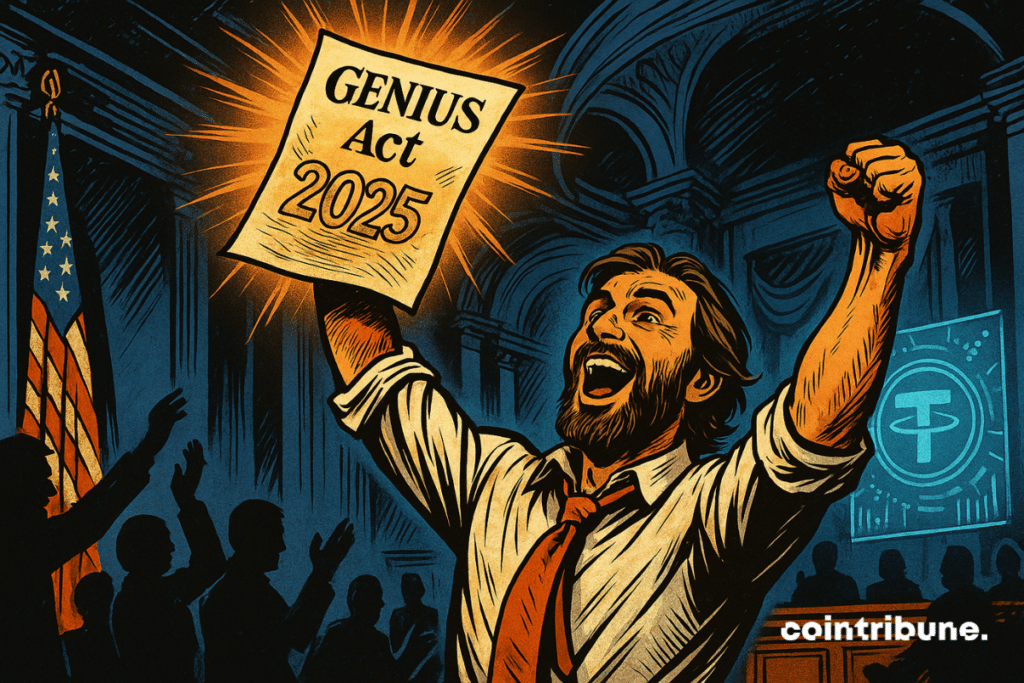Tether CEO Hails GENIUS Act as Crypto’s Regulatory Breakthrough Moment
Crypto's rulebook just got a rewrite—and the industry's biggest players are popping champagne.
The GENIUS Act isn't just another piece of legislation. It's the regulatory pivot stablecoin issuers have been begging for since the last bull run crashed into compliance headaches. Tether's C-suite is already framing this as their 'I told you so' moment.
Wall Street won't like what comes next.
Forget 'guidance' or 'frameworks'—this law carves crypto's place in finance with a chainsaw. Exchanges get clearer custody rules. Stablecoins escape purgatory. And every institutional trader who mocked digital assets now faces a brutal choice: adapt or get rekt.
Of course, the fine print still lets regulators slap down anything too decentralized. Some things never change.

In brief
- Ardoino applauds the GENIUS Act and promises full compliance with the US market.
- Two stablecoins will be launched: USDT for abroad, a new one for American institutions.
- The Tether-Circle rivalry intensifies, each playing their transparency or media revival card.
- Tether’s arrival could boost Bitcoin liquidity but increase crypto systemic risks.
White House and crypto: Tether finally plays at home
A few hours after the, Paolo Ardoino, CEO of Tether, savored this moment as a rebirth. “We are very proud to be here and to be directly mentioned by the president, as it reflects all the great work done by our team over the past few years“, he declared(source).
This is no small matter. Once criticized by regulators, Tether is now. Ardoino continues with volleys: audits, compliance, transparency… The man even promises, specially designed for institutions. No more Caribbean haze, welcome to America with its lobbies and big four.
In this now viral tweet, dated July 18, he wrote: “Now that President TRUMP has led the United States to adopt digital assets, we believe we can multiply our impact and establish the global dominance of the dollar“.
This sets the scene.
Two stablecoins for two Americas: USDT navigates between strategy and survival
Facing the GENIUS Act,: USDT on one side, a domestic version of the stablecoin on the other. The USDT will continue to exist via a “foreign issuer pathway,” aimed notably at expatriates and cross-border transfers. The new token targets Wall Street, with a promise: efficiency and full compliance.
Institutions are used to super efficient markets, and they count every basis point; that is why we must design something suited to this new market.
Paolo Ardoino – Source: CoinDeskMeanwhile, Circle, Tether’s major rival, displays calculated calm: “The GENIUS Act truly codifies in law the way Circle does business. We have always been trustworthy, transparent; we have been subject to public audits for five years.”
The battle betweenintensifies, each holding on to its niche. One claims historic compliance; the other bets on a swift, media-driven repositioning. Ardoino must therefore convince quickly, effectively, and powerfully.
Crypto under pressure: Tether, Bitcoin, and SMEs on a tightrope
Tether’s entry into the American regulatory fold will not please everyone. While the impact on Bitcoin could be massive, the collateral effects on crypto market stability remain to be watched.
Some significant figures:
- USDT weighs 161 billion dollars: it is the largest stablecoin in the world;
- 500 million users have already adopted it, according to Ardoino;
- Circle has had five years of regular public audits, compared to zero for Tether… for now;
- Coinbase invested 25 million dollars in Fairshake to push crypto bills in Congress.
With this new legislation, Tether could. More USDT on American crypto exchanges means more buying, more volume, more volatility. But beware of boomerang effects: liquidity mismatches, increased leverage, concentration of risks.
And what about crypto SMEs? They will have to juggle transparency, compliance, and compliance costs. Giants like Tether can absorb the impact. Smaller players, however, risk buckling under regulatory weight. Tether opens a breach. But everyone must be able to cross it.
Tether’s American pivot impresses. Yet, thousands of kilometers away, a very different war is underway. In Europe, Ardoino strongly opposes the MiCA regulation. He deems its requirements “dangerous” for banks and contrary to financial freedom. As a result, several platforms are removing USDT from the European market. The future of the king stablecoin now seems torn between two continents.
Maximize your Cointribune experience with our "Read to Earn" program! For every article you read, earn points and access exclusive rewards. Sign up now and start earning benefits.

